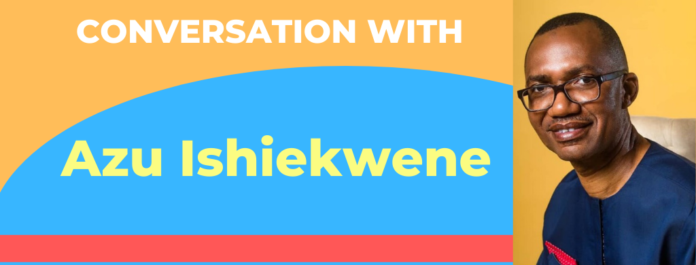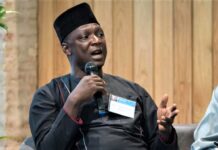Three – maybe three and a half – stories go to the heart of why Nigeria appears stuck in a rut. And for some strange reason, all of them are rooted mainly in energy and power.
By Azu Ishiekwene
Three – maybe three and a half – stories go to the heart of why Nigeria appears stuck in a rut. And for some strange reason, all of them are rooted mainly in energy and power.
The first is about a project, the Mambilla Hydroelectric Project. If you live in Nigeria – except you’re the Minister of Power, Adebayo Adelabu – there’s a good chance you would have heard about this project, which is located in Gembu, Taraba State.
In that case, there’s a chance you might also have heard that the national power grid, more in the news for collapsing than for generating power, collapsed three times last week, plunging most parts of the country into darkness. The Minister of Power is too busy making excuses to notice.
Mambilla, rolling grid collapse
But he doesn’t have to worry. Others are counting the number of grid collapses for him. In its lead story on October 21, PUNCH reported that the national grid has collapsed 105 times in 10 years despite the government’s $1.4 billion in loans to fix the problem. If we still have the appetite for more loans to waste, the report said an additional $2.9 billion from the World Bank could indulge our irresponsibility.
But that’s just the beginning of the Mambilla story. I’d be foolish to claim there’s one single Mambilla story. There isn’t. But this is a version from several trusted, ringside sources. Sometime in 2003, President Olusegun Obasanjo visited the Three Gorges Dam, the world’s largest power station in China, with an installed capacity of 22,500 MW.
READ ALSO:
Otti`s charge to youths on participation in politics
He liked what he saw and wanted the company to replicate something on a smaller scale in Mambilla. At the time, it was estimated that the dam would generate an additional 3,050 MW for Nigeria, a chronically underpowered country struggling to generate 2,500MW for over 200 million people. The project was divided into three lots at a contract sum of roughly $6 billion to be delivered in five years.
Sunset on a contract
Since the word “contract” and Nigeria are made for trouble, trouble started. Sunrise Power and Transmission Company, promoted by Leno Adesanya, teamed up with North China Power and China Hydroelectric to bid for Mambilla. It seemed, however, that that was not the original plan, which was to have China Three Gorges Corporation, the China state-owned power company that built Three Gorges, build Mambilla, or at least build Lot 1.
One thing led to another, and the Minister of Power at the time, Dr. Olu Agunloye, who said he believed he was acting on behalf of the Nigerian government, awarded the contract, as turnkey, at $6 billion to Sunrise through “a letter of intent” in 2007.
Sunrise and its Chinese partners turned up at Mambilla, as did China Three Gorges, based on Obasanjo’s invitation: two significant contractors, two separate invitations, one task, and one divided government. But the government soon changed hands. Obasanjo was out, and President Umaru Yar’Adua was in.
Sorry, we can’t pay
In 2009, Adesanya pressed Yar’Adua to cancel Lot 1, which was awarded to the Chinese because it was a turnkey project for Sunrise. The government did, but funds were not released for the project to commence. Meanwhile, China Three Gorges backed off at the first smell of trouble, leaving Nigeria to stew in its misery.
In 2015, President Muhammadu Buhari came in and cancelled the project. Adesanya was furious and went to the International Court of Arbitration in Paris, demanding $2.3 billion and $400 million in two separate arbitrations for the government’s alleged breach.
Former Attorney General and Minister of Justice Abubakar Malami, doing what he did fantastically well, renegotiated the penalty with Adesanya to $200 million. Buhari refused to pay, and as Adesanya headed back to Arbitration, the EFCC dragged him and Agunloye, charging the latter with seven counts of forgery, contract award without approval, disobedience to presidential orders, etc.
Long story short, 12 years after Mambilla was supposed to have been completed with all its transformative promises in power, rail, roads, infrastructure, and jobs (not to mention the missing N30 billion Obasanjo left in the project account), we’re still in a rut, stewing deeper and deeper in the misery of rolling blackouts and collapsing grids.
Isn’t it possible, for God’s sake – and the sake of the bigger picture – for this government to end the drama around the project and save Baby Mambilla from the stale, disposable bathwater?
Wilbros war
This second story illustrates how such a missed opportunity never ends well. It’s the story of Wilbros, one of the biggest things in Port Harcourt, Rivers State, in its heyday. In 2008/2009, when the ego war between Obasanjo and his former deputy, Atiku Abubakar, was at its peak, the EFCC, never missing a chance to outdo itself, said Wilbros senior officials had paid $6 million in bribes to top members of the ruling People’s Democratic Party (PDP).
A director of the company pleaded guilty to the charge in a US federal court, and the EFCC pounced. Fair enough, but what was the company, Wilbros, doing, and was it not possible to prosecute the errant directors without destroying the company? At the time of the blowout, Wilbros, a US-Nigerian-based company, was building the West African Gas Pipeline.
Dream deferred
It was Nigeria’s biggest oil and gas construction company, competing with Saipem and having over 3,000 workers. The gas pipeline was massive. According to the World Bank, completion of the project would have improved the competitiveness of the energy sectors in Ghana, Benin, and Togo by promoting cheaper and environmentally cleaner gas from Nigeria instead of solid and liquid fuels for power generation and other industrial and commercial uses.
Wilbros was at 80 percent completion of the gas pipeline project when the EFCC struck. The matter dragged and dragged. By 2013, Wilbros’s massive pipeline coating plant was rotting, among other valuable assets worth billions of naira. The company was wrecked by its inability to finish the project, yet nothing emerged from the prosecution of the big names bandied about as suspects, including former GMDs of NNPC. Wilbros sold off its remnant to Ascot, and the rest is history.
Pan Ocean’s troubled sea
Pan Ocean is the third story. Pan Ocean, an indigenous oil and gas exploration company, embarked on one of the most audacious projects of its life. Under Dr. Festus Fadeyi, its chairman at the time, the company invested over $500 million in a gas project to feed the Escravos-Lagos Pipeline System and the West African Gas Pipeline.
It was supposed to have an impact similar to what Wilbros attempted to do. But there was a problem. The chairman, also a significant shareholder in Skye Bank at the time, had allegedly overborrowed from the bank, forcing it to over-leverage. He had reportedly borrowed about N240 billion, over half of the bank’s total debt.
When Buhari’s government pounced in 2015, some of the funds had found their way into oil mining leases, including OML 98 managed by Pan Ocean, which was among the seven revoked. The critical point is that all mining leases that reverted to NNPCL, ostensibly in the public interest, have served neither the public interest nor those of the original owners. They have become NNPCL’s ATM.
Mother of them all
The half of the three stories, actually the mother of them all, is the Ajaokuta Steel Company. It’s the story of a wasting N4 trillion asset for another day. It competes with the four state-owned refineries in demonstrating how ego, primordial greed, and monumentally poor judgment could lead to state collapse.
Yet, carefully and thoughtfully managed, these cases could have helped lessen our current misery.
One man willing to go on the record on this matter, Dan D. Kunle, power and energy expert and professional of over 30 years, told me last week, “It’s an irony that Nigeria is suffering amid these great opportunities when presidential intervention could turn the page and bring this country the relief it needs badly.”
Three stories, one message: Who will bell the cat?
Ishiekwene is the Editor-In-Chief of LEADERSHIP and author of the new book Writing for Media and Monetising It.















